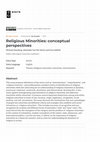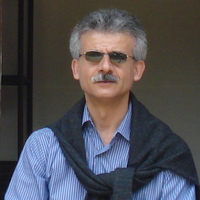Papers by Michael Stausberg

Religion, 2021
Article 1 of the Constitution of the International Association for the History of Religions (IAHR... more Article 1 of the Constitution of the International Association for the History of Religions (IAHR) stipulates that this non-profit organization ‘has as its objective the promotion of the academic study of religions through the international collaboration of all scholars whose research has a bearing on the subject. The IAHR is not a forum for confessional, apologetical, or other similar concerns.’ The specific modus operandi of the discipline is stated in positive and negative terms, but the description spends more words on what it shall not be than on what it aims to be. As is well known, attempts to define the aims of the IAHR not solely as an academic cause, but as a ‘science’ in a stricter sense – most clearly expressed in the initiative to change the name of the association – have so far failed; there is no consensus that the English terms ‘science’ or ‘scientific’ are appropriate to determine the nature of our study. A similar term is ‘naturalistic’, which seeks to exclude supernaturalistic factors, be it on epistemological, metaphysical, methodological, or ontological grounds; as supernaturalism is a common definiens of religion, naturalism serves to factor out religion as a causal factor in the study of it, and/or to safeguard its non-religious quality. Yet another related term to potentially define the nature of our scholarly pursuit could be ‘secular’. Is the academic study of religion/s a secular pursuit? On the one hand, this seems like an obvious choice. After all, ‘confessional’ and ‘apologetic’ can be read as stand-ins for ‘religious’: even if we study religions, our concern is not religious. In this sense, the term secular, if understood as the binary opposite of religious, would merely replicate the paradoxical gesture of affirmation and denial and thereby not aid our imagination to get a sense of our aspirations. Yet, can we afford to be non-secular, or would that mean trespassing into illegitimate territory of our excluded other (i.e., apologetic-confessional or dogmatic theology)? Are there other meanings of the term secular that would spark narratives of aspiration without being wedded to a specific ideology? Maybe the idea of an academic study free from any non-academic inferences and interventions of all sorts can be as positive as it can get? Have we perhaps moved beyond the secular-religious dichotomy altogether, as indicated by the programmatic yet slippery notion of the post-secular—unless we may find ‘that the postsecular perpetuates the secular entrapments that it presumes to resolve’, as one of the guest-editors of this thematic issue claims (Furani 2015, 2). Or will the secular—people identified as secular and ideas of secularity and secularism—become an object of study like the nascent interdisciplinary field of secular studies seems to indicate? In this thematic issue, anthropologists of religion approach the importance of the secular from another angle: to what extent is anthropology conditioned or constituted by the secular? Rather than a liberation from the grasp of religion, the concern here is to challenge the stricture of the secular as a mode of revitalizing anthropology. As the guest-editors point out in their introduction (Furani and Robbins 2021), in the extensive reflexive self-questioning that has characterized anthropology during the past half-century, the secular has escaped self-
The Demise of Religion, 2020

DIN - Tidsskrift for religion og kultur, Feb 25, 2016
En GjEnnoMGanG aV EMPIRISK FoRSKnInG oG En hISToRISK KonTEKSTUalISERInG aV hVoRdan lyKKE BlE TIl ... more En GjEnnoMGanG aV EMPIRISK FoRSKnInG oG En hISToRISK KonTEKSTUalISERInG aV hVoRdan lyKKE BlE TIl ET lEdEMoTIV I nyERE TIdS RElIGIonShISToRIE MIChaEl STaUSBERG lykke har etablert seg som et tverrfaglig forskningsfelt. det foreligger en rekke studier om sammenhengen mellom religion og lykke (eller subjektivt velvaere), men verken nyere religionsteorier eller religionsvitenskapelig forskning har viet temaet oppmerksomhet i saerlig grad. denne artikkelen ser først på den religionsteoretiske litteraturen og går siden gjennom en rekke sosialvitenskapelige studier om religion-lykke-sammenhengen. I en historisk del argumenterer artikkelen for at modernitetens tanke om at mennesker har en rett til lykke har ført til at religioner har endret sine vurderinger i den grad at lykke har blitt til et ledemotiv i samtidsreligiøsiteten. nøKKEloRd: lykke, lykkestudier, subjektivt velvaere, Koranen, dalai lama det er ikke lenger bare filosofer, skribenter, regissører, kunstnere og legemiddelindustrien som er interessert i hva som gjør mennesker lykkelige. Psykologer, økonomer, hjerneforskere og andre har også begynt å forske på lykke. den tverrfaglige lykkeforskningen har blomstret det siste tiåret. nå foreligger det til og med en rekke studier om mulige sammenhenger mellom religion, eller religiøsitet, og lykke(følelse). de
Theorizing Rituals, Volume 1: Issues, Topics, Approaches, Concepts, 2006

Journal of Contemporary Religion, 2015
The world of religious experience is changing much faster than the discipline that claims to stud... more The world of religious experience is changing much faster than the discipline that claims to study it. Religious studies still uses Christianity as its measure, still frames the world through the model of five world religions, still largely avoids analysis of key issues around power, poverty, violence, pollution, science, and social conflict, and still looks to highlight differences rather than commonalities. Methods for the Study of Religious Change aims to redefine the study of religion as the study of worldviews, of ideas which are active in shaping the world. It argues that the study of religion should focus on people’s worldview-making capacities and should contribute to the critical analysis of global problems and the promotion of cultural and spiritual respect across religions. Survey chapters on theory and method outline this new approach, while case-study chapters illustrate these ideas with innovative ethnographies of ritual, experience, language, morals and identity.

Archiv für Religionsgeschichte, 2001
In seinen 1985 veröffentlichen Haskell-Lectures hat Kurt Rudolph die These formuliert, die akadem... more In seinen 1985 veröffentlichen Haskell-Lectures hat Kurt Rudolph die These formuliert, die akademische Disziplin der Religionswissenschaft bzw.-geschiente (lustory of religions) sei ein Kind der Aufklärung. 1 In seinen Heidelberger Max-Weber-Vorlesungen hat Hans G. Kippenberg einige Jahre später Zweifel an der Aufklärungsthese angemeldet und die Gegenthese aufgestellt, die Religionswissenschaft sei "eher ein Kind der romantischen Kritik an der Aufklärung als der Aufklärung selber" gewesen. 2 In seiner kürzlich publizierten Gerda Henkel Vorlesung aus dem Jahre 1998 hat der Bonner Theologe Martin Honecker eine weitere Hypothese vorgetragen, wenn er behauptet, im 16. Jahrhundert beginne sich "[ejine vergleichende Religionswissenschaft ... herauszubilden/' 3 Auf der Suche nach den geistigen Ursprüngen der Religionswissenschaft warten die Herausgeber des vorhegenden Bandes des Archivs für Religionswissenschaft nun wieder mit einer neuen These auf: Im 17. Jahrhundert habe sich ein "neues Paradigma wissenschaftlicher Auseinandersetzung mit dem ,Heidentum c " 4 herausgebildet? Jan Assmann und Guy G. Stroumsa nennen einige Kriterien zur inhaltlichen Bestimmung dieses Paradigmenwechsels: Sie sprechen von einem ,geschärften historischen Bewusstsein c und einer .Verschärfung der theologischen Differenzen', die den Diskurs des 17. Jahrhunderts von der Faszination für die ^heidnischen Mysterien 40 unterschieden, die für die Renaissance charakteristisch gewesen sei. Im ,Goldenen Zeitalter der Antiquare' sei es bereits zu einer neuartige« Spannung zwischen "kanonischer Überh'eferung und kritischem Antiquarianismus" gekommen. Im 17. Jahrhundert seien "die Grundlagen eüies modernen, kritischen, .unpartheylichen' Umgangs mit religiösen Phänomenen" aufzuspüren, "der sich allmählich gegen dogmatische und polemische Standpunkte durch-setzte~. Die von Assmann und Stroumsa zur Diskussion gestellte These richtet sich explizite gegen die ausschließliche Zuschreibung dieser Errungenschaften an das 19. Jahrhundert, als der Historismus neue Parameter historischen Arbeiteris definierte und die Reli

Religion, 2014
working-class manufacturing town to a service-based economy, where approximately 40% of its busin... more working-class manufacturing town to a service-based economy, where approximately 40% of its businesses offer ‘spiritual’ products, is a fitting end to the book, as precisely this transition has been seen across varied Western cultures, more or less. The ideas underpinning Gauthier and Martikainen’s volume are not new, as the seminal article by David Loy, ‘The Religion of the Market,’ was published in 1997, almost 20 years ago. What the collection offers, however, is a more detailed set of empirical case studies that illustrate the depth of the imbrication between religion, spirituality, and the late-capitalist, neoliberal economy. There are some omissions and weak spots, particularly in the area of why people consume, and what consumption means, despite the ‘Introduction’ opening up these topics. The whole oeuvre of Colin Campbell springs to mind, with its emphasis on desire and emulative fantasy as a Romantic legacy, which nevertheless dovetails with the capitalist economy’s demand that citizens consume. His theoretical position is fully articulated in The Romantic Ethic and the Spirit of Modern Consumerism (2005 [1987]), but of particular relevance is the chapter ‘I Shop Therefore I Know I Am: The Metaphysical Basis of Modern Consumerism’ in Karin M. Ekström and Helene Brembeck’s edited volume, Elusive Consumption (2004). Yet these are relatively minor criticisms that do not compromise the value of the book; Religion in Consumer Society: Brands, Consumers and Markets is strongly recommended.
Temenos, 1998
uu.se. Publications. ...
Religious Studies Review, 2018
The Copernican Turn in the Study of Religion richard king The academic future of religion as a co... more The Copernican Turn in the Study of Religion richard king The academic future of religion as a concept will need to focus on deconstructing the category and analyzing its function within popular discourse, rather than assuming that the category has content and seeking to specify what that content is.
Zoroastrian Rituals in Context, 2004

Religious Minorities: conceptual perspectives, 2023
This essay proposes definitions of key terms such as 'minoritization', 'majoritization', and 'rel... more This essay proposes definitions of key terms such as 'minoritization', 'majoritization', and 'religious minority', and problematizes standard criteria of identification of religious minorities while also advocating for an understanding of religious minorities as dynamic, processual, relational, contextual, situational, and intersectional. By doing this, it also warns against homogenizing representations of religious minorities and addresses minorities within minorities. It presents several important distinctions among and within religious minorities in terms of size, location, origin, legitimacy, recognition, social position, and self-perceptions. The essay discusses the mechanisms that turn assemblages of people into minorities and di erent criteria and strategies that establish such social formations as 'religious minorities.' This includes processes of recognition and nonrecognition by societies and di erent forms of minorities ('wild' and 'tame' ones). The essay historicizes the emergence of the category and the problem of 'religious minorities' in the context of colonialism, modern conceptions of the nation-state, democracy, and international politics. Last but not least, it reflects on the importance of religious minorities as a theme for research, and as a lens for understanding the dynamics of religion in society.
Religion, Brain & Behavior, 2014
Let me start with a disclaimer: I am not a psychologist (of religion or anything else). So, if yo... more Let me start with a disclaimer: I am not a psychologist (of religion or anything else). So, if you want to have an assessment of the second edition (2013) of the Handbook of the Psychology of Relig...
Handbook of Leaving Religion, 2020
An electronic version of this book is freely available, thanks to the support of libraries workin... more An electronic version of this book is freely available, thanks to the support of libraries working with Knowledge Unlatched. More information about the initiative can be found at www .knowledgeunlatched.org.











Uploads
Papers by Michael Stausberg